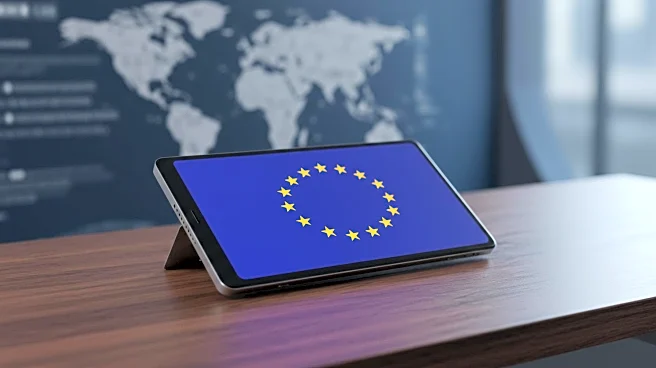What is the story about?
What's Happening?
The European Union is exploring ways to reduce its reliance on American technology companies, such as Google, Microsoft, and Amazon, which currently provide 70% of Europe's cloud-computing infrastructure. This dependency has raised concerns about digital sovereignty, defined as the ability of a governing body to control data and technology systems within its borders. The issue gained urgency when Karim Khan, the top prosecutor at the International Criminal Court, lost access to his Microsoft Outlook email account after being sanctioned by the White House. Although Microsoft claims it did not suspend services, the incident highlighted vulnerabilities in Europe's tech infrastructure. Some EU public bodies are already seeking alternatives to US providers, but the lack of comparable European options poses a challenge.
Why It's Important?
The EU's dependence on US tech giants has significant implications for its digital sovereignty and security. If relations with the US were to deteriorate, there is a concern that American companies could be compelled to disrupt services, affecting critical data and state functions. This scenario underscores the need for Europe to develop its own tech infrastructure to safeguard against potential geopolitical risks. The shift towards digital sovereignty could lead to increased investment in local tech companies and open-source solutions, potentially reshaping the European tech landscape and reducing the influence of US firms.
What's Next?
The EU may consider implementing regulations that encourage regional organizations and governments to adopt local technology solutions. Initiatives like Gaia X, aimed at creating a European-based cloud platform, could gain momentum despite previous delays and criticisms. Additionally, countries like Germany and Denmark are piloting schemes to replace US tech products with open-source alternatives. These efforts could accelerate over the next five to ten years, driven by growing awareness and concerns about cybersecurity and digital sovereignty.
Beyond the Headlines
The push for digital sovereignty in Europe could have broader implications for global tech markets. As Europe seeks to establish its own tech infrastructure, it may focus on areas where it has existing strengths, such as industrial AI and chipmaking equipment. This shift could lead to increased competition and innovation in these sectors, potentially challenging the dominance of US tech companies. Moreover, the move towards open-source solutions could promote transparency and accessibility, influencing tech policies worldwide.















